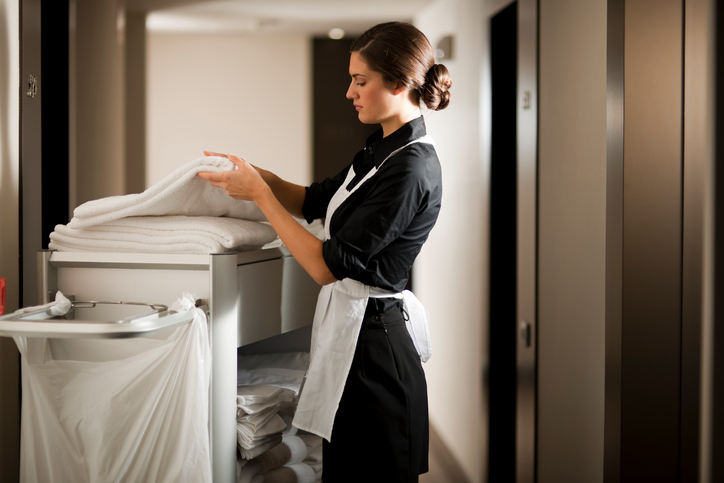Some U.S. cities, including Chicago and Seattle, legally require hotels to supply panic buttons that allow their housekeeping staff to summon help in a crisis. Other hotel chains are also adding these small wireless devices voluntarily.
Panic buttons can be lifesavers if housekeeping staff arrive first on the scene of a fire or crime in progress. Moreover, panic buttons can be vital tools in helping workers report incidents of sexual harassment or assault.
The panic button trend reveals an often-overlooked facet of sexual harassment: incidents involving a company’s staff, customers, or vendors. These instances of harassment and assault are not limited to the headline-grabbing industries involving movie producers, actors, CEOs, and others who were supervisors or co-workers of their victims.
Sexual harassment is of course illegal, regardless of what position of authority a person or victim has. This applies even to potential hotel guests, even in a consumer-driven economy where “the customer is always right.”
Hotels, cleaning staff, and harassment
Hotels create unique opportunities for sexual harassment to go unreported. Housekeeping staff, typically women, enter rooms alone and encounter guests who might wander the room undressed, make offensive remarks, or stray into the territory of sexual advances.
The nearest co-worker is often on a different floor and it might take a supervisor 10 minutes or more to arrive at the site of the incident.
The staff member doesn’t know exactly what to do. They’re trained to indulge guests’ behavior to some extent, but where do they draw the line? And what are their options when the behavior is threatening and frightening?
This is where the remote panic button comes into play.
How a panic button helps hotel workers
A panic button is about the size of an automobile’s key fob. It has one big button in the middle. When pressed, the device sends a wireless signal to a nearby receiver or a smartphone (or both, depending on the company providing the panic button).
Pushing the panic button sends an alert to supervisors, security staff, and anyone else the hotel’s management deems important. The alert uses GPS monitoring to reveal the exact room or location where the incident is happening so help can be sent as soon as possible. Mobile apps that process the alerts also can track incidents and provide analytics data to supervisors.
In addition to summoning help, the panic button creates a digital record of the incident. Device logs provide vital evidence in court to back up a victim’s claims.
Liability ramifications for hotels
The #MeToo movement is emboldening more people to speak out about sexual harassment and assault. Union leaders representing hotel housekeeping staff have been among the most vocal advocates of panic buttons. That’s to be expected from the labor side of the collective-bargaining continuum.
What’s telling, though, is that many hotels are adding panic button technology without the prodding of labor activists or local governments. Hotel leaders acknowledge that employees in the housekeeping department should have the same protections and security measures as anyone else.
“It’s a nice add-on to our already communicative environment,” Mitch Langeler, vice president of talent and culture at SMASHotels, told the Chicago Tribune. “Anything that keeps our employees safe, or more safe, is absolutely welcomed.”
As word of panic button installations spreads across the hospitality industry, managers have to consider the ramifications of declining to embrace the trend. Employers have a legal obligation to protect their employees from sexual harassment. In court, a jury might react negatively to an employer that denies workers a simple a tool to report such incidents in real time to get help.
Insurance helps defray costs of defending a harassment claim
Panic buttons make sense on several levels. They create evidence that can hold up in court. They can help hotel staff sound the alarm on all sorts of crises in addition to sexual harassment.
But like all technologies, they have their limits. It’s impossible to predict the day when a guest may harass or assault a member of your housekeeping staff. But if it happens, you can be held liable. And you may rack up considerable legal fees defending yourself.
General commercial liability policies cover some of these legal scenarios, but not all. To plug coverage gaps, McGowan Program Administrators has crafted Hotel Umbrella Insurance that covers sexual harassment and other employment-related claims.
With the emergence of the #MeToo movement, hotel leaders need to understand they have more than a moral duty to address the scourge of workplace sexual harassment. They also have a legal obligation to obey the law and a responsibility to investors and owners to prudently manage the risk of sexual harassment claims.
If you’re unsure whether your commercial liability coverage has enough protection for sexual harassment claim liabilities, give one of our experts a call today.
Related articles:
4 Reasons Why Hotels Need Cyber Insurance



